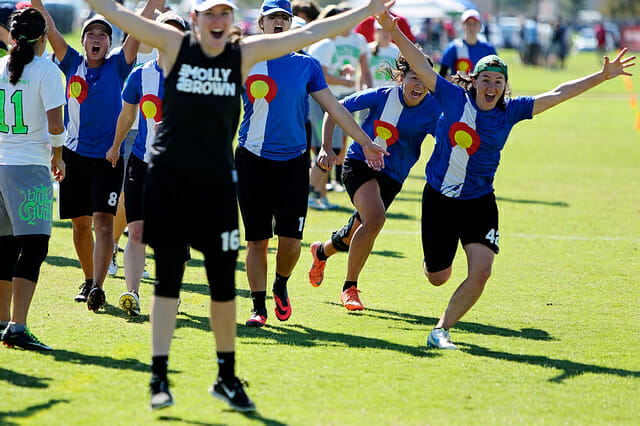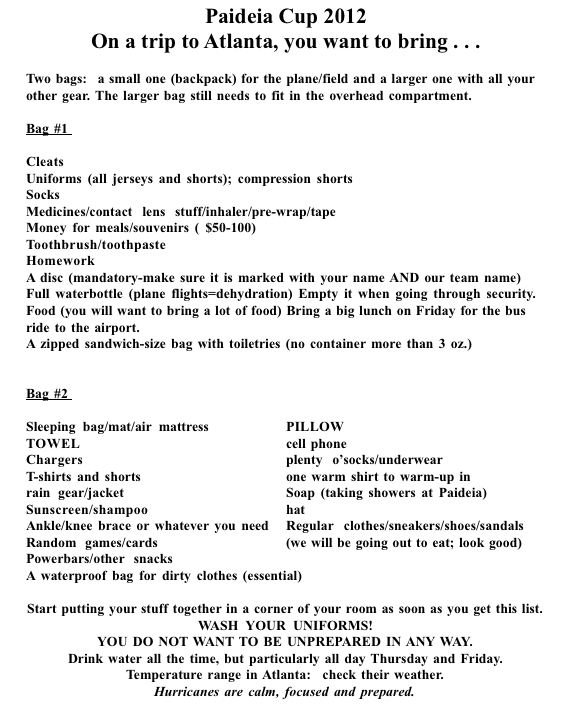February 18, 2014 by Tiina Booth in Analysis, Opinion with 8 comments

Don’t do this. Don’t do that. You are mentally weak if you talk about the score. You don’t have a chance if you obsess about the other team.
Sometimes I think that a mental toughness program looks like a laundry list of Don‘ts. Because this catalogue of mental mistakes runs counter to what most athletes have been taught about competition, we need to consider some solutions that will replace these mental traps.
An effective mental toughness program should be the basis of everything else you do with your team. Its development should be treated with the same energy, time, and dedication as any other part of your team. If your athletes spend a lot of pre-season time in the gym, working on their mental approach will give everyone better results. If you spend hours discussing what kind of strategies you will use as a team, the best way they will be able to consistently execute those strategies is if they have spent some time working on their brains. And when you are in a tough situation on a Sunday, your mental toughness regimen will become much more important than anything else you have done all year.
A good mental toughness program does not just happen. Leaders must make a concerted effort to learn the basics and translate them easily to their teammates. These 4 solutions should cover the many uncontrollables a team meets every day.
Build a Bubble
Sportscasters love to talk about the home field advantage, a classic example of focusing too much on an uncontrollable. Since everyone has to play at their opponents’ homes, it makes sense to prepare for this challenge instead of just talking about it. Most ultimate teams are always at an away game, because of our tournament format. Our solution is to build a bubble, or a dome, or whatever imagery works for you, and transport it to wherever you are playing.
This bubble makes you feel at home. The sideline is the foundation, which should look similar no matter where you are. A tent is the most essential ingredient, as it protects you from weather as well as providing a clearly defined home base. Add a tarp, some chairs, water jugs, a table for food, trash bags and, if you are lucky, parents making sandwiches.
Your warm-up ritual should also remain the same most of the time. Each teammate should know exactly what this plan is and bring the energy consistently, even if they don‘t feel it or “feel like it.” Coaches should know how long the warm-up takes and make adjustments if need be.
Our first ritual of the day looks something like this: relaxed throwing, intentional throwing, dynamic warm-up, break, very brief team talk, throwing drill, cutting drill, announce starters, cheer, and begin. Keep chatter to a minimum. Make the mental switch from socializing at breakfast to being ready to work your hardest during this time. Don’t wait until the first few points in a game to be ready to play or you may find yourself down 3-0. Whatever ritual you choose to use, it should be deliberate and, for the most part, unchanging. It should be developed at practice and honed at tournaments.
We are also very committed to a buddy system. Each player should be connected to 1-3 other players on the team. This works for many reasons, but mainly because it is a conscious effort to connect to someone other than yourself. You will have someone to throw with, give directions to from the sideline and confide in if things turn tough. Breaking down hierarchy is important as you build a team and having a buddy system is a good way to do that.
One last thing. If possible, get your team to the fields the day before for a very loose throw-around. No need to run drills or even scrimmage. Just have fun and feel comfortable at this new location. Demystifying a venue goes a long way to negating any home field advantage.
Be Ready for Anything
I am a big believer in showing up early to practices and tournaments. I don’t want to be the first team there, throwing in the mist amidst the volunteers putting out cones. But I loathe the rush and panic of arriving late. Showing up early may be one of the easiest ways to sidestep some mental traps. Your team will have enough time to do everything and they even may be a overeager to play, which is always good. And if the other team arrives late, that’ll work too.

I am also a bit of a weather freak. I start checking the weather more than a week ahead of time, as silly as that is. I like to know exactly what conditions we will be facing so the players will know what to bring. This may be unnecessary for a college or club team, but it is essential for high school squads.
Every player receives a “What to Bring” list, which is modified depending on whether we are staying at someone’s home, at a hotel or on whether we are flying. Coaches should make sure that their team also has a full med kit, enough discs and all the necessary paperwork.
What about those players who tumble out of their vans at the last moment, clearly not ready to play? To show up at a tournament with no food or water or appropriate clothes or a disc is more than irresponsible. It is a clear message that the team means nothing to you.
While teams pride themselves on being able to play under these self-created conditions, this grows old quickly. Creating problems because you are lazy is a form of sabotage. If your team consistently underperforms because of ill-preparedness, you have a built-in excuse that theoretically takes away the sting of losing. If you never really try, you can always tell yourself that you could have won.
Nurture Your Sideline
A sideline is a living, breathing organism that needs to be stoked and fed. Both sides of the field are important, so do not relegate the non-starters to the far sideline. If you do, you will find them clumped together, far away from the action on the field, talking about how much better the team will be when they are seniors. Suggestions to make your sideline healthier:
1) Switch sidelines every 2 or 3 points. This prevents stagnation by keeping people moving and involved in the game.
2) At practice, determine the exact words the sideline will use to give information to the on-field players. It doesn’t matter what they are as long as everyone uses the same words all the time.
3) Only one person gives directions to one player at a time. This should be a no-brainer, but I often see and hear multiple people yelling at one player, or even worse, yelling at the wing that is on the far side, 30 yards away from them.
4) When your team scores, cheer. When your teams gets scored on, cheer. If someone has an audiotape of the game, they should not be able to tell what is happening because the noise on your sideline is always at a constant level. Why emphasize getting scored on with a drop of energy from the sideline? This is exactly the moment that you all need to step up and support each other.
5) When you huddle during a game, do not only discuss what is happening on the field. I remember an old video with ol’ Steve Mooney saying something at half time like, “I’m not hearing the voices yet.” I regularly ask the team for a number that reflects how the sideline is doing, with 10 being the best it can be. Often the number is a 5 or 6, which should be embarrassing to everyone.
You aren’t on the field, you can drink water and maybe have something to eat, you can gossip with a teammate, but you can’t be an active member of the sideline?! Unacceptable.
Have No Expectations
Instead of focusing on everything you cannot control, a much better use of a your mental energy is to have no expectations. I hesitate to even introduce this phrase, as it is always the most difficult idea to teach, but even partial mastery of it can lead to success. I have struggled with this concept throughout my coaching career and it is a painful lesson I have learned over and over, almost every season.
“No Expectations” is contrary to what most coaches and teams think and say. It means that you go into EVERY GAME with no predetermined idea of what you will accomplish. First game of pool play on Saturday against a team that you have dominated all season: no expectations. Rematch against a team that always whines and cheats: no expectations. Finals for the first time against someone you’ve never beaten in the history of the program: no expectations.
Your team may need a gimmick to help them embrace this strategy. We call every team Team X throughout the season. First game of the season, we are playing Team X. Last game of the season, Team X again. You are trying to neutralize the power of your opponent when you play them. Why not start early and not even give them a name?
Do not watch them warm up. Do not listen to their cheers. Do not try to predict the outcome of your game by focusing on their stars or their injuries. If you are focusing on the other team, you are disregarding your own. Look around and see what you can do instead: fill water bottles, stretch out a teammate, warm up your throws.
This is also where downplaying the importance of the score comes in. This may seem impossible to do, but if you can get to the point where you don’t think about the score, you will absolutely play better. Again, you are striving to stay in the moment, and information from the scoreboard forces you either into the past or into the future. And, really, you cannot control the outcome of any game. All you can control is how hard and efficiently your team can run on O and D.
If you spend too much time focusing on how you expect the game to go, you will be unable to stay in the moment and the possibility of collapse is much greater. I have seen many teams with a big lead start taking the outcome for granted. The other team begins to come back, and they start obsessing on the dwindling score while they are still playing! They are focusing on what they cannot control, instead of taking care of the immediate business at hand.
Embracing an effective mental toughness program will make every aspect of your team stronger and better. It may seem daunting to try to put together a complete program in one season but I suggest your start with a few things this spring. You will see almost immediate results, and maybe even the scoffers on your team will pay attention. And if they don’t, just ignore them because they are just another uncontrollable.